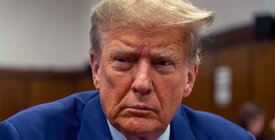You’re reading The Briefing, Michael Waldman’s weekly newsletter. Click here to receive it in your inbox.
“When the president does it, that means that it is not illegal.” So said Richard Nixon after his resignation. At the time, Nixon was mocked. Now, after last week’s disastrous oral arguments, the Supreme Court seems poised to enshrine that sentiment as the law of the land.
Much has been said about the hearing, which considered whether Donald Trump was immune from prosecution for his bid to block the peaceful transfer of power. This should have been a quick, unanimous matter: of course he can be prosecuted. Instead, the conservative justices sounded like defense lawyers, warning of doom if presidents are held legally accountable.
Some of us are hoarse from howling about the hearing. Let me share a few points to consider.
Start with Justice Brett Kavanaugh. Trump, it is said, acts impulsively and rarely plans ahead. Not when choosing a Supreme Court justice: in 2018, as he mulled possible nominees, Trump picked the one most likely to say he couldn’t be indicted, as I wrote at the time.
Kavanaugh had been a Javert-like pursuer of President Bill Clinton as a prosecutor in the 1990s. But by the time he was working for President George W. Bush, he proclaimed that presidents should not be indicted, or even investigated. Not to worry, he reassured: former presidents could be charged, of course.
Last week we heard none of that clarity. Instead, Kavanaugh vented about Morrison v. Olson, a case that upheld the investigations of presidents and the Independent Counsel Act — a law which has long lapsed and did not apply to the current case. He also seemed to approve of the idea that statutes might need to specifically mention the president “so that the president’s on notice and can conduct himself” accordingly. I’m not holding my breath that Kavanaugh will return to his prior position that ex-presidents can be prosecuted.
A second point: originalism is a sham. Here, history’s evidence is overwhelming. Members of the Brennan Center’s Historians Council, along with other scholars, detailed in a friend-of-the-court brief that the founders did not want to create a king who was above the law. Ignore all the originalists’ huffing and puffing about “history and tradition.” We heard little of that.
The conservatives did cling to one scrap of founder wisdom. Benjamin Franklin said: “History furnishes one example only of a first Magistrate being formally brought to public Justice. Everybody cried out ag[ain]st this as unconstitutional.” But as historian Holly Brewer has explained in detail, Franklin was complaining about English law, and argued that our Constitution should provide for the punishment of the chief executive.
What about textualism, the supposed fealty to the commas and clauses of the Constitution? The distinction the conservative justices propounded between a president’s official acts and unofficial acts is spelled out in Article II, Section . . . actually, nowhere. It’s made up, by judges, perhaps on the spot.
Can we please put to bed the pretense that there is intellectual integrity to originalism as practiced by this Court?
Finally, let’s also discard any remaining pretense that this Court believes in judicial restraint. John Roberts memorably said, “If it’s not necessary to decide more to dispose of a case, in my view it is necessary not to decide more.” We did not hear that from him, or the other conservatives. More typical was Justice Neil Gorsuch when he intoned that they had to rule “for the ages.”
The question before the Court is not what the outer limits of presidential immunity might be, but whether Trump is immune from prosecution for his alleged crimes. It is not an official act to try to overthrow the Constitution and block the peaceful transfer of power, even if you conspire with other government employees to do it.
In other eras, justices showed restraint even in big cases with the presidency at stake. In United States v. Nixon in 1974, the Court ruled that yes, there is such a thing as executive privilege, and yes, there are times it should be honored — but in this case, hand over your tapes! Nixon resigned two weeks later.
Chief Justice Warren Burger, appointed by Nixon, wrote that decision. The ruling was unanimous. Days later, Sen. Barry Goldwater and other party leaders visited Nixon to urge him to resign. The president’s own party cut him loose. This time, the Court looks ready to turn toward Trump, not away. Maybe they are reading the latest polls. Today, many Republican institutions and some previous Trump critics are making their peace with him.
All of which suggests that this Court is not just a conservative Court, or a Federalist Society Court, or even a Republican Court — it is becoming a MAGA Court. That turn augurs ominously for the rule of law. If we have a future president compelled to declare “I am not a crook,” the Court should not respond, “If the president does it, that means it is not illegal.”






